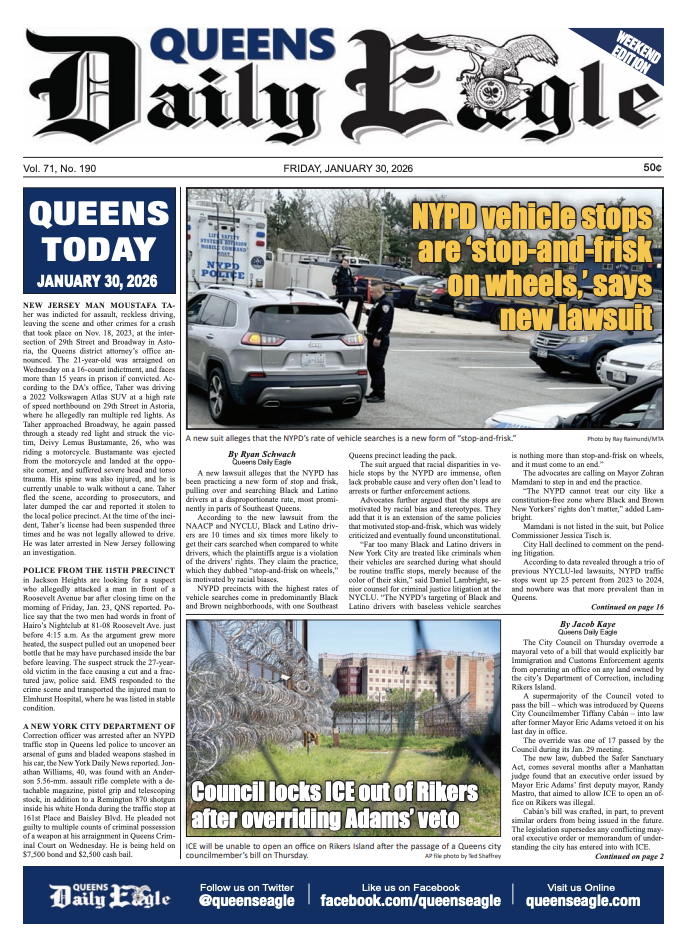Community board votes in favor of Flushing Creek waterfront rezoning
/Activists stood in the rain to protest the Flushing Creek waterfront rezoning before the Community Board 7 hearing on Monday night. Eagle photos by Victoria Merlino.
By Victoria Merlino
Amid a chaotic public hearing where protesters filled the room with shouting and chanted “shame” at board members, Queens Community Board 7 voted to approve a Flushing Creek waterfront rezoning proposal that would reshape Northern Flushing with $1 billion in private investment.
The residential rezoning of a piece of the waterfront was approved with 30-8 with one abstention from Community Board Vice Chairperson Chuck Apelian, who is a consultant to the developers involved with the project.
The rezoning would pave the way for FWRA LLC, a partnership of three developers that own the land, to create a 13-tower, mixed-use complex of housing, hotels, offices and shops across the 29 acres of mostly unutilized land.
Representatives of the developers, including attorney Ross Moskowitz, highlighted the benefits of the plan at the hearing Monday night. They said the proposal includes a privately maintained road network that the public will be able to access, foster almost 3,000 new jobs, increase waterfront access and public open space.
The developers will also decontaminate the land and do brownfield remediation for the project, supporters say. Flushing Creek and Flushing Bay are polluted by sewer water, waste and chemicals from overflowing waste water treatment plants.
“It is really a transformative project. Something that a lot of people said couldn’t get done,” Moskowitz said. “But these owners — they’re not developers. They’re owners. They actually own this property. This is private property. They’ve come together as a group, working together, to come up with a program that has a holistic look at this whole neighborhood.”
Moskowitz and community board members reiterated throughout the night that only one parcel of land in the $1 billion development would need to be rezoned, and as such, the owners could adjust plans and make it an as-of-right development without the suggested benefits and input from the community if the rezoning was not approved.
The Community Board 7 hearing was standing room only, and lasted late into the night as advocates for and against the rezoning clashed.
“Absent this project, none of this is going to happen,” Moskowitz said of the community improvements. The plan takes into account public input from previous iterations and conceptions of the project in 1998, 2004, 2008, 2011 and 2016, he added.
Advocates from the MinKwon Center for Community Action, the Local 32BJ Service Employees International Union, the environmentalist organization the Guardians of Flushing Bay and others argued during the public comment section of the night that the plan was extremely flawed, and did not provide enough affordable housing, union jobs or environmental protection.
Since only the northernmost parcel of land would need to be rezoned, the entire project — mostly on as-of-right property – will not have to comply Mandatory Inclusionary Housing, a city mandate that forces developers to create a certain number of “affordable housing” units.
Advocates said that at most, only 90 units of housing will be mandated affordable, depending upon the plan that is enacted.
At one point, Community Board 7 Chair Eugene Kelty and Special Flushing Waterfront District Committee Chair Joseph Sweeney went to the back of the room and admonished protesters for being disruptive. Their presence caused an even larger disruption, and police intervened as protesters broke out in chants of “Let us speak.”
Kelty grabbed at one protestors phone, prompting even more denunciations from opponents. He later apologized for getting angry at protesters.
Flushing Chamber of Commerce Executive Director John Choe, himself a community board member, spoke out in opposition to the plan.
He asked his fellow members not to be “railroaded” into accepting the proposal. “We as representatives have to envision a community, a project, a plan that will address our needs. Not the needs of developers,” he said.
Though he could not vote because of his connection to the project, Apelian argued that it was a good idea for the community board to proceed with the project. He said that during a similar meeting where the community board was fighting for more affordable housing in the One Flushing development, housing activists were not there to help them fight.
“I don’t like the way this board is being portrayed. This board is very, very thorough in what we do,” Apelian said. “And we know exactly what needs to be done, and we know the processes, and we try to work it out.”
Queens’ Acting Borough President Sharon Lee now has 30 days to make her advisory recommendation on the plan. She plans to hold a public hearing later on Feb. 20 or March 12, a Borough Hall spokesperson said.
The City Council will ultimately vote on the proposal. The Council traditionally votes in lock step with the local member on land use matters. Councilmember Peter Koo has not taken a firm stance on the rezoning.





